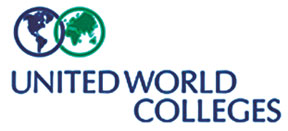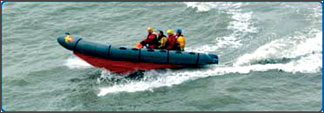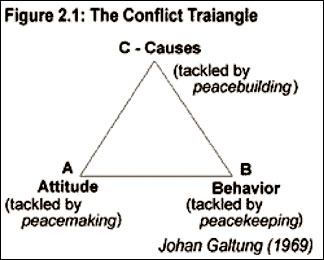|
College experience:
Education for sustainable future
by Tamsyn JN Green
[email protected]
When written in Chinese, the word 'crisis' is composed of two
characters; one represents danger and the other represents opportunity.
Sri Lanka is no stranger to political tensions claimed to be fast
approaching civil war in the international media.
 However, Peace Researcher, John Galtung, used a model (shown below)
to illustrate that conflict is a dynamic state that can implement
positive changes in society. Causes, attitudes and behaviour constitute
the three aspects of conflict that can be addressed by peace-building,
peace-making and peace-keeping respectively. However, Peace Researcher, John Galtung, used a model (shown below)
to illustrate that conflict is a dynamic state that can implement
positive changes in society. Causes, attitudes and behaviour constitute
the three aspects of conflict that can be addressed by peace-building,
peace-making and peace-keeping respectively.
In the wake of a world recovering the loss and suffering of the
Second World War, German Educationalist Kurt Hahn founded the United
World Colleges movement in 1962.
Hahn believed that bringing together young people from across the
world could impact change in societies threatened by political, racial
and religious hostilities.
 Mission Statement: The United World Colleges (UWC) movement makes
education a force to unite people, nations and cultures for peace and a
sustainable future. Mission Statement: The United World Colleges (UWC) movement makes
education a force to unite people, nations and cultures for peace and a
sustainable future.
There are currently thirteen colleges across the world, which are
part of this unique educational movement bringing together young people
from more than eighty different countries to live, study and serve the
community.
Voluntary national committees in each country select young people on
the basis of personal merit to enrol in the UWC experience. Students
study subjects from six categories for the International Baccalaureate
Diploma, as well as studying theory of knowledge and completing an
independent research essay in their chosen field.
Community service is an equally valued component of college life and
all students commit to volunteering regularly. Services range from
social work in the community to first aid and rescue services at sea! In
addition to this, an intense activities programme requires that students
participate in sports, arts and keep abreast of current affairs and
global concerns.
Students in the Inshore Lifeboat Service train on the Bristol
Channel, United World College of the Atlantic.
While the UWC share a common goal, each is characterized by its
unique environment. The most recent UWC in Bosnia Herzegovina aims to
confront the ethnic tensions still present in this part of former
Yugoslavia.
 Opened by Her Majesty Queen Noor of Jordan, the president of the
United World Colleges, in September 2006, it is the first school in the
country to bring students from the three ethnic groups (Bosniac, Serb
and Croat) to one classroom since the late 1980s, before the Balkan War
shunned any hope of international tolerance. Opened by Her Majesty Queen Noor of Jordan, the president of the
United World Colleges, in September 2006, it is the first school in the
country to bring students from the three ethnic groups (Bosniac, Serb
and Croat) to one classroom since the late 1980s, before the Balkan War
shunned any hope of international tolerance.
Today, all other students in the region study a curriculum determined
by their ethnicity. For example, one school teaches Croat students in
the morning, before new staff arrives for teaching Bosniac students in
the afternoon.
A former student of the United World College of the Atlantic in the
UK, Beth Hillier, is currently volunteering at the UWC in Mostar (UWCiM).
Reporting from Mostar, Beth Hillier says, 'Since the war, Mostar's
Croats and Bosniacs have been living, almost exclusively, in separate
neighbourhoods.
What is so unique about UWCiM is that it provides a neutral ground
where young Bosnians of all ethnic groups, away from any pressures in
their home communities, can live and learn together as the previous
generations did before the war. From what I have seen in the past month,
it has really worked.
In class, the cafeteria, and out in town the students socialise
together with peers from other ethnic groups so comfortably that it is
easy to forget that, though the war ended more than a decade ago, there
are still very few young people who have the opportunity to do the same.
The UWCiM students share a common language and a collective history,
but moreover, they share the desire to see their country overcome
detrimental ethnic barriers and to see its people, all of its people,
move forward together toward the future.'
The UWC movement is growing all the time, but the network is limited
by funds and by accessibility. While there is only a tiny percentage of
graduates world-wide, the foundations of the movement lie in a belief
that young minds can be agents of change, a belief that can operate
globally.
The colleges are fuelled by the dynamics of an international student
body, but the long-term aim is that people will return to their home
countries to confront issues most relevant to their own society.
Armed with an internationally recognized qualification, it is not
surprising that many students pursue further education at top
universities in the UK and the US. However, it is important to remember
that a prestigious education can be most profoundly implemented in areas
less able to provide such educational privileges.
|
